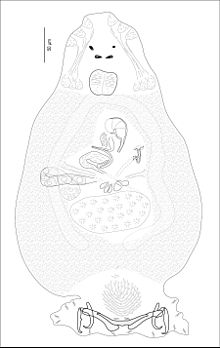Pseudorhabdosynochus caledonicus
This article may be confusing or unclear to readers. (December 2022) |
| Pseudorhabdosynochus caledonicus | |
|---|---|

| |
| Scientific classification | |
| Domain: | Eukaryota |
| Kingdom: | Animalia |
| Phylum: | Platyhelminthes |
| Class: | Monogenea |
| Order: | Dactylogyridea |
| Family: | Diplectanidae |
| Genus: | Pseudorhabdosynochus |
| Species: | P. caledonicus
|
| Binomial name | |
| Pseudorhabdosynochus caledonicus Justine, 2005
| |
Pseudorhabdosynochus caledonicus is a diplectanid monogenean parasitic on the gills of the Blacktip grouper, Epinephelus fasciatus. It has been described in 2005.[1]
Description
[edit]
Pseudorhabdosynochus caledonicus is a small monogenean, 0.5 mm in length. The species has the general characteristics of other species of Pseudorhabdosynochus, with a flat body and a posterior haptor, which is the organ by which the monogenean attaches itself to the gill of is host. The haptor bears two squamodiscs, one ventral and one dorsal.
The sclerotized male copulatory organ, or "quadriloculate organ", has the shape of a bean with four internal chambers, as in other species of Pseudorhabdosynochus.[2]
The vagina includes a sclerotized part, which is a complex structure. It has been described as "a heavily sclerotised ‘trumpet’, followed by sclerotised test-tube shaped cylinder, with heavily sclerotised structure associated laterally with cylinder and a lateral structure, roughly star-shaped, with small chamber communicating with lumen of cylinder".[1]
Etymology
[edit]Pseudorhabdosynochus caledonicus was named for the type-locality, New Caledonia, in the South Pacific.
Hosts and localities
[edit]
The type-host and only recorded host of P. caledonicus is the Blacktip grouper, Epinephelus fasciatus (Serranidae: Epinephelinae). The type-locality and only recorded locality is off Nouméa, New Caledonia.[1] Only about 20% of the host fish were infested.[1][3]
References
[edit]- ^ a b c d Justine, Jean-Lou (2005). "Species of Pseudorhabdosynochus Yamaguti, 1958 (Monogenea: Diplectanidae) from Epinephelus fasciatus and E. merra (Perciformes: Serranidae) off New Caledonia and other parts of the Indo-Pacific Ocean, with a comparison of measurements of specimens prepared using different methods, and a description of P. caledonicus n. sp". Systematic Parasitology. 62 (1): 1–37. doi:10.1007/s11230-005-5480-0. ISSN 0165-5752. PMID 16132868. S2CID 35119181.
- ^ Kritsky, D. C.; Beverley-Burton, M. (1986). "The status of Pseudorhabdosynochus Yamaguti, 1958, and Cycloplectanum Oliver, 1968 (Monogenea: Diplectanidae)". Proceedings of the Biological Society of Washington. 99: 17–20.

- ^ Hinsinger, Damien D.; Justine, Jean-Lou (2006). "The ' Pseudorhabdosynochus cupatus group' (Monogenea: Diplectanidae) on Epinephelus fasciatus, E. howlandi, E. rivulatus and E. merra (Perciformes: Serranidae) off New Caledonia, with descriptions of Pseudorhabdosynochus cyathus n. sp. and P. calathus n. sp". Systematic Parasitology. 64 (2): 69–90. doi:10.1007/s11230-005-9018-2. ISSN 0165-5752. PMID 16773473.
